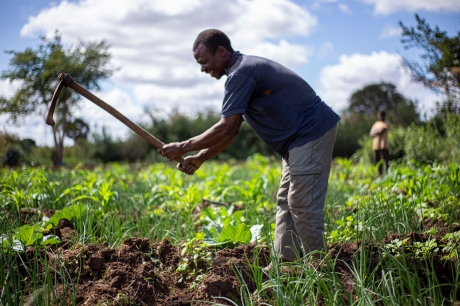
Local authorities gave Ali a plot of land and FAO provided him with a farming kit, including vegetable seeds and tools, so that he could restart farming to be able to feed his family. ©FAO/Fábio de Sousa
When Ali Ndalila had to flee his home in Mozambique’s northernmost province of Cabo Delgado, he was heartbroken for many reasons. Not the least of them was having to abandon the particularly bountiful harvest that followed a lucky wet season.
The region is blessed with idyllic landscapes, from pristine Indian Ocean beaches to stunning mountains, but the once peaceful lives of the region’s 2.3 million inhabitants, have been shattered over the last six years by violence from non-state armed groups.
Ali, his wife Florinda and their five children are among the more than one million people who have been displaced from their homes.
From being able to support themselves by growing corn and peas on his two-hectare farm in Namande village, Ali’s family had no choice but to leave everything behind when the insurgents attacked their village, torching most of the houses. They headed for the neighbouring Montepuez district and arrived “thankful for our lives but despairing for our future and what would become of us,” Ali lamented.
Their immediate needs were met by a cousin of Ali’s who lives there and who took them in and fed them; yet Ali was devastated to witness the sheer strain on his cousin of having to support the two households.
Supporting displaced families
However, families from the country’s destabilised Cabo Delgado Region are now getting a chance to start over. Local authorities soon allocated Ali and his family a 0.5-hectare plot of land to farm. Then FAO provided him with a farming kit to enable him to get back into production. Like many other Internally Displaced Persons (IDPs), Ali received enough vegetable seeds and farming tools from FAO to produce sufficiently for his family for six months.

The assistance, provided under FAO’s northern Mozambique Agriculture Livelihoods Response Plan, supports IDPs and host communities with tools and training to increase and diversify their incomes, access nutritious food and improve their diets.
More than 80 per cent of Cabo Delgado’s inhabitants are small-scale farmers reliant on agriculture for their livelihoods; therefore, the violence and conflict in the area have taken a tremendous toll on, not only their safety and well-being, but also their livelihoods and nutrition.
They are now relying on support from FAO and its partners to help them restart their livelihoods. While supporting IDPs, FAO also supports host communities to encourage social inclusion, build a peaceful environment and reduce the strain on natural resources.
A new lease on life
Ali describes the assistance he received as having given him “a new lease of life”. “The land, seeds, tools and technical support have all played a big role in where I am today,” he says emotionally. He can now comfortably feed his household and sell the surplus produce to buy other necessities like medicines.
“I have already started selling produce from my new farm,” Ali says, adding, “The onions and cabbage are fetching great prices because the quality is a notch above the available options at the market.”
Ali has also received technical support on his okra, pumpkin and bean crops from FAO technical officers, who routinely go back to check on the progress made by project participants. To Ali, with his good memory for both names and faces, they have become familiar figures whom he’s happy to meet again.
“Together with our local government partners, FAO has been making a difference to the lives of many IDPs like Ali and his family, but the scale of internal displacement amid the violence in Cabo Delgado continues to threaten the livelihoods of more and more families and demand our increased efforts to support host communities and IDPs as they get back on their feet in unfamiliar surroundings,” says FAO Representative in Mozambique, Dario Cipolla.
Ali is living proof that IDPs can provide for themselves with the proper support that helps them generate livelihoods and more easily integrate into host communities, FAO stated. With the conflict resulting in over a million displaced people to date and the potential for many more, FAO and its local partners are calling on countries for additional support so that the Organization can continue to assist over 967 000 IDPs in 2023.
Source: the FAO News and Media office, Rome
– global bihari bureau




